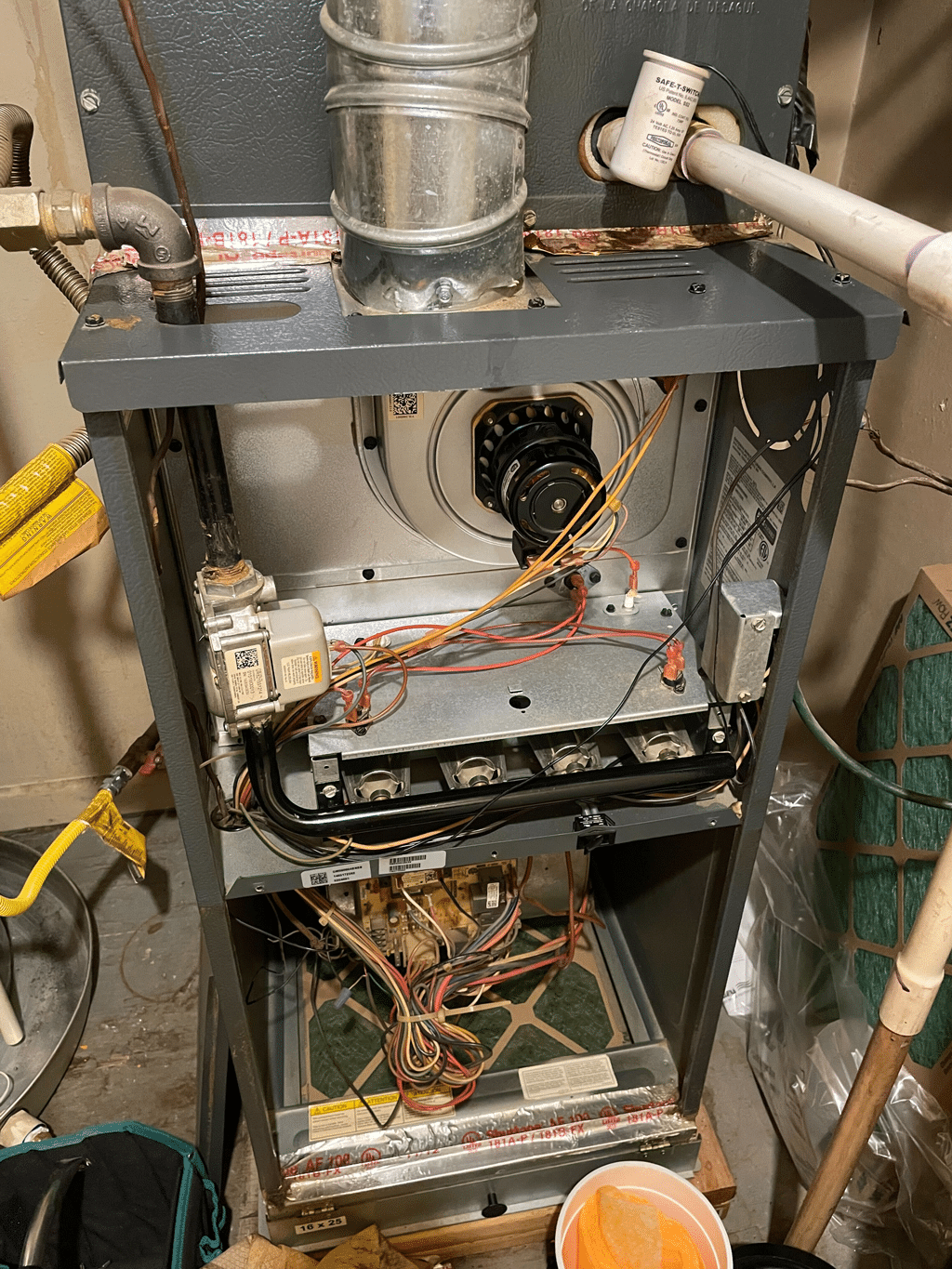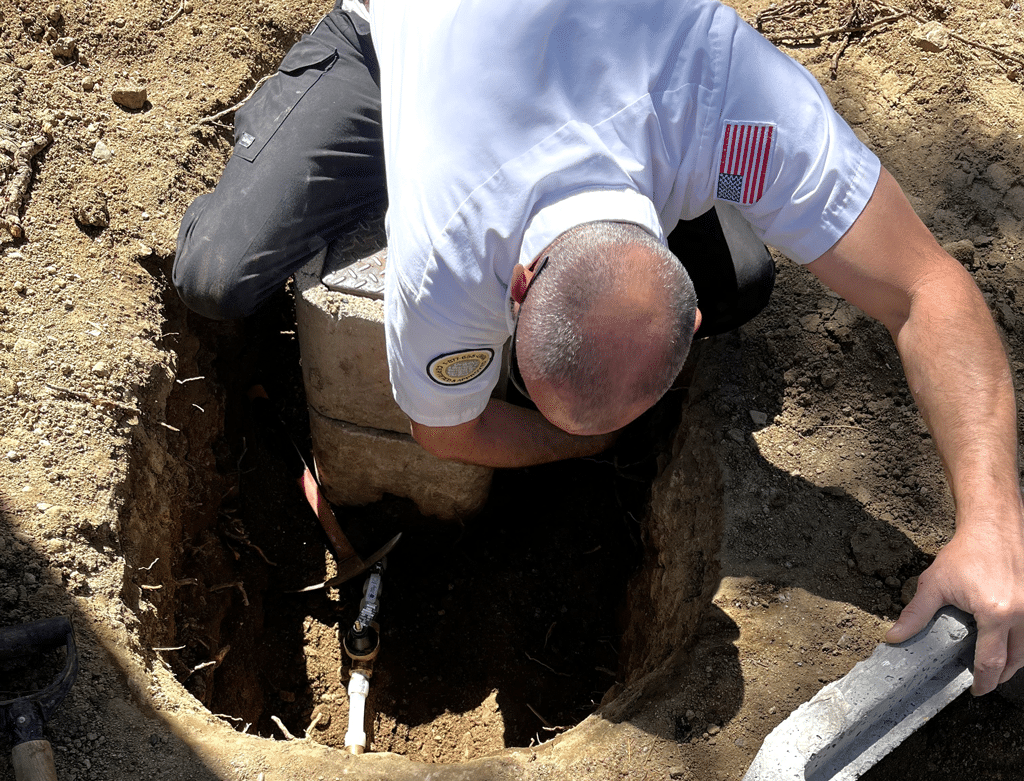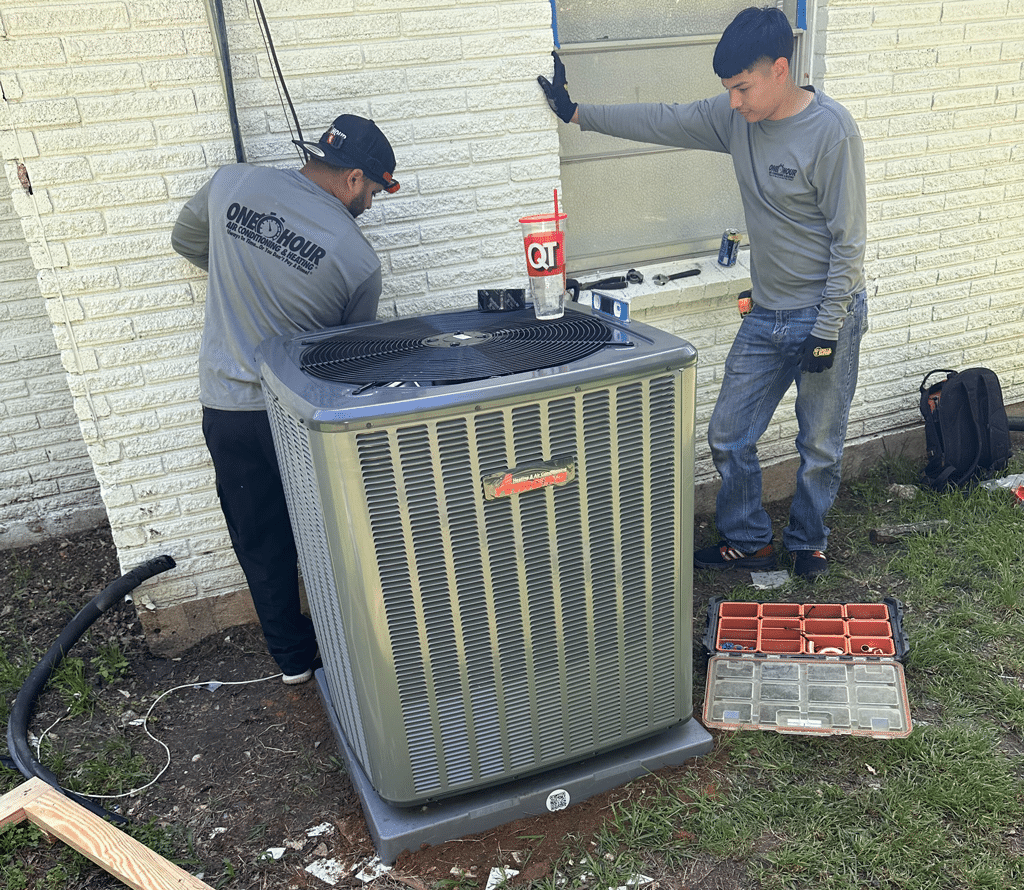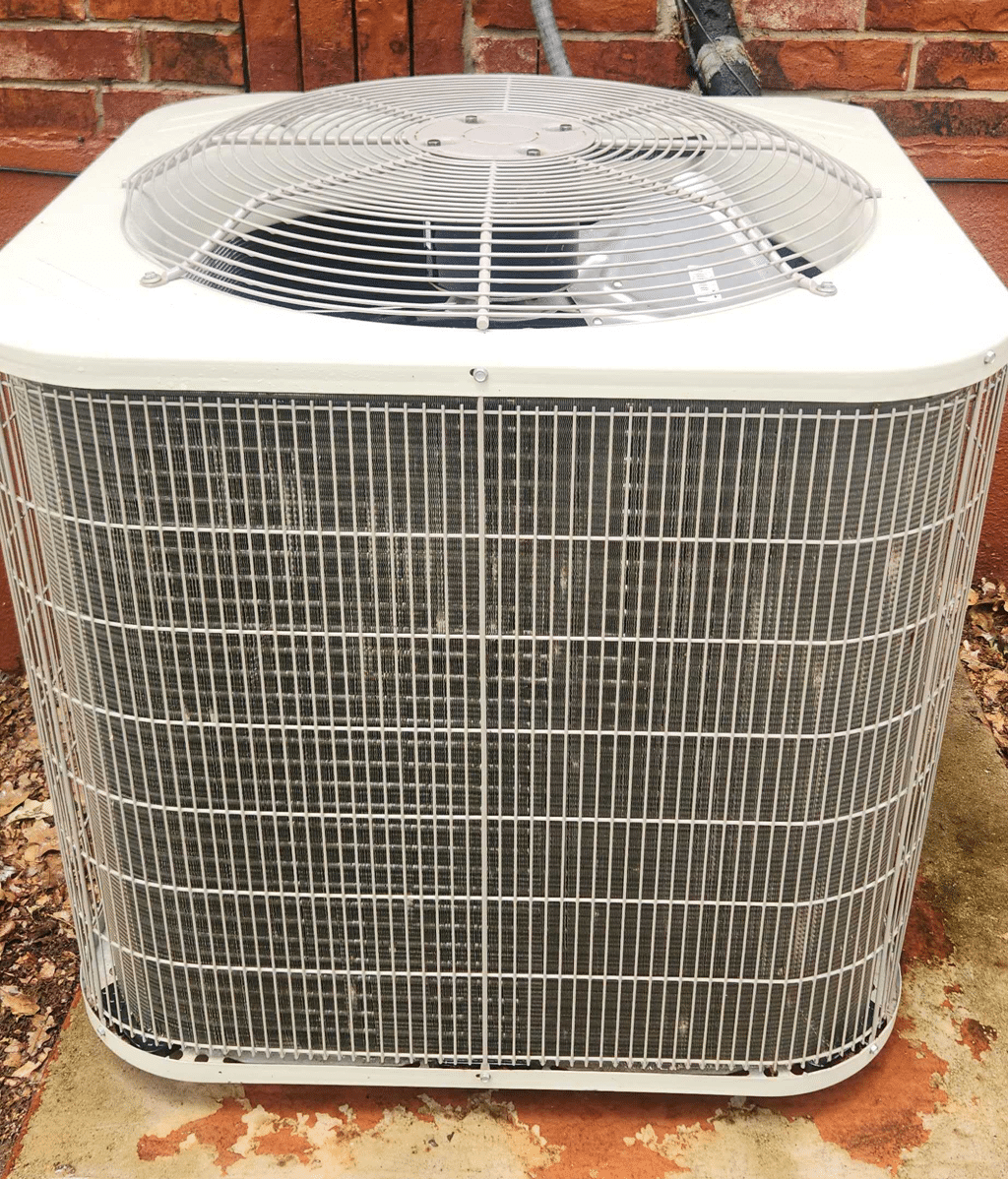
Residential HVAC Installation: Game-Changing Tips
Have you ever wondered how to enhance the comfort and efficiency of your home through Residential HVAC installation?
As a homeowner, you understand the importance of a well-functioning heating, ventilation, and air conditioning (HVAC) system. It’s not just about staying warm in winter or cool in summer; it’s about creating an environment that’s comfortable, healthy, and energy-efficient.
In this article, we delve deep into the world of HVAC systems, specifically focusing on tips for residential HVAC installation.
We’ll explore everything from choosing the right system for your home to understanding the installation process.
Whether you’re considering a new installation or upgrading your current system, this guide will provide valuable insights to make informed decisions.
Also read: Ac Unit Frozen Pipe Outside: Quick Fixes For Homeowners
What is Residential HVAC Installation?
Residential HVAC installation refers to the process of setting up a heating, ventilation, and air conditioning (HVAC) system in a home. This type of installation is crucial for maintaining a comfortable indoor environment throughout the year, regardless of the external weather conditions.
The process typically involves several key steps, each of which plays a vital role in ensuring the efficient and effective operation of the HVAC system.
Firstly, the selection of the HVAC system is an essential step. Homeowners must choose a system that suits their specific needs, considering factors like the size of the home, climate, and energy efficiency.
Different types of systems are available, including central air conditioners, heat pumps, and furnaces. Each type has its own set of advantages and is suitable for different climates and home sizes.
The next step in residential HVAC installation is the design and planning phase. This involves determining the optimal layout for ductwork, vents, and the HVAC unit itself.
Professional residential HVAC installation service providers typically perform a detailed analysis of the home’s layout to ensure proper air distribution and energy efficiency. They also consider factors like the home’s insulation and air sealing to optimize the system’s performance.
Installation is the most critical phase. This involves the physical installation of the HVAC unit, ductwork, and other components.
Professional technicians ensure that the system is installed correctly, adhering to safety standards and local building codes. Proper installation is key to the system’s longevity and efficiency.
Finally, the testing and commissioning phase ensures that the newly installed HVAC system operates correctly.
Technicians will test the system for proper airflow, thermostat operation, and overall efficiency. This step is crucial to identify and rectify any issues before the system is put into regular use.
A Detailed Explanation of HVAC Installation
HVAC installation is a critical process that requires careful planning and execution. It involves several steps, each crucial for ensuring the system operates efficiently and effectively.
Before embarking on the journey of residential HVAC installation, it’s essential to grasp the fundamentals of what an HVAC system is and its pivotal role in your home. HVAC stands for Heating, Ventilation, and Air Conditioning, a technology integral to maintaining a comfortable and healthy living environment.
These systems are not just about temperature control; they are about enhancing the quality of air in your home, ensuring that it’s clean, fresh, and at a comfortable temperature.
Heating
The heating component of an HVAC system is crucial, especially in colder climates. It typically involves a furnace or a heat pump that works to increase the temperature inside your home.
This system uses various energy sources, such as gas, electricity, or oil, to generate heat, which is then distributed throughout your home via ductwork or radiators.
Understanding the heating aspect is vital when considering tips for residential HVAC installation, as the choice of heating system can significantly impact your home’s energy efficiency and comfort levels.
Ventilation
Ventilation is another critical component of HVAC systems. It involves the exchange of indoor air with outdoor air, ensuring that you have fresh air circulating in your home.
This process is essential for removing indoor pollutants, moisture, and odors, thereby improving the overall air quality.
Ventilation can be natural, through windows and vents, or mechanical, using fans and ducts. When planning your residential HVAC installation, consider the ventilation needs of your home to ensure a healthy living environment.
Air Conditioning: Keeping Cool and Comfortable
The air conditioning component is what most people think of when they hear residential HVAC installation. It’s all about removing heat and moisture from the indoor air to cool down your home. Air conditioners come in various types, including central air systems, window units, and split systems.
Each type has its own installation requirements and efficiency levels. When installing an HVAC system, choosing the right air conditioner is crucial for ensuring comfort during the warmer months.
The Importance of a Well-Functioning HVAC System
A well-functioning HVAC system is not just a luxury; it’s a necessity for maintaining a comfortable and healthy home environment. It regulates temperature, ensures clean air circulation, and maintains optimal humidity levels.
When considering tips for residential HVAC installation, it’s important to understand each component of the HVAC system and how they work together.
This knowledge will help you make informed decisions about the type of system that best suits your home, leading to improved comfort, better air quality, and energy efficiency.
Understanding Your Residential HVAC Installation Needs
Assessing Home Size and Layout
The journey to a successful residential HVAC installation begins with a thorough assessment of your home’s specific needs. The size and layout of your home play a pivotal role in determining the type and capacity of the HVAC system required.
A system that’s too small won’t effectively heat or cool your entire home, while one that’s too large can lead to unnecessary energy consumption and increased costs.
It’s crucial to calculate the square footage of your home and consider the layout – including ceiling heights and window placements – to ensure the selected system can efficiently manage the air flow and maintain a consistent temperature throughout.
Considering Local Climate
The local climate is another essential factor in choosing the right HVAC system. If you live in an area with extreme temperatures, be it hot or cold, your HVAC system will need to be robust enough to handle these conditions.
In milder climates, a less powerful system might suffice, potentially offering savings on installation and energy costs.
Understanding the seasonal temperature ranges and humidity levels in your area will guide you in selecting a system that’s tailored to your local environment, ensuring optimal comfort and efficiency.
Personal Preferences and Lifestyle
Your personal preferences and lifestyle should also influence your residential HVAC installation decision. If you or your family members have allergies, for instance, you might consider a system with advanced air filtration capabilities.
For those keen on technology, modern HVAC systems offer smart features like programmable thermostats and remote control via smartphones, providing convenience and enhanced control over your home’s climate.
Additionally, consider your long-term plans – if you intend to expand your home, for instance, choose a system that can accommodate this future growth.
Energy Efficiency and Sustainability
In today’s world, energy efficiency and sustainability are more important than ever. Opting for an energy-efficient HVAC system not only reduces your carbon footprint but also leads to significant savings on utility bills.
Look for systems with high Seasonal Energy Efficiency Ratio (SEER) and Energy Star ratings. These systems, while potentially more expensive upfront, pay off in the long run through lower energy consumption.
Understanding your HVAC needs involves a comprehensive evaluation of your home’s size and layout, local climate, personal preferences, and energy efficiency requirements.
By considering these factors, you can ensure that your tips for residential HVAC installation lead to a system that is perfectly suited to your home, providing comfort, efficiency, and peace of mind.
Also read: Revolutionize Comfort: Water Pipe Heating Systems Unveiled
How to Choose the Right System for Residential HVAC Installation
Understanding Different Types of HVAC Systems
When it comes to residential HVAC installation, understanding the variety of systems available is crucial. The most common types include central air conditioners, heat pumps, furnaces, and ductless mini-splits.
Each type has its unique features and is suitable for different home environments and climates. Central air conditioners are ideal for homes requiring both heating and cooling, while heat pumps offer an energy-efficient alternative to traditional heating and cooling methods.
Furnaces are a popular choice in colder regions, and ductless mini-splits provide a flexible solution for homes without existing ductwork.
Energy Efficiency Considerations
Energy efficiency is a key factor in selecting the right HVAC system. Systems with higher Seasonal Energy Efficiency Ratio (SEER) and Annual Fuel Utilization Efficiency (AFUE) ratings are more efficient and can significantly reduce your energy bills.
Modern HVAC systems are designed to be more energy-efficient, helping homeowners save money and reduce their carbon footprint.
When exploring options, look for the Energy Star label, a government-backed symbol for energy efficiency, ensuring that the system meets strict energy efficiency guidelines.
Cost and Budgeting
The cost of an HVAC system is a major consideration for most homeowners. While higher efficiency systems may have a higher initial cost, they can offer greater savings in the long run through reduced energy bills.
It’s important to balance the upfront cost with potential long-term savings. Additionally, consider the cost of installation, which can vary depending on the complexity of the system and the specific needs of your home.
Tailoring to Your Home’s Specific Needs
Every home has unique heating and cooling needs, influenced by factors such as size, layout, insulation, and local climate.
A system that’s too large for your home can lead to inefficient operation and increased costs, while a system that’s too small won’t adequately heat or cool your space.
Consulting with a professional HVAC contractor can help you determine the right size and type of system for your home, ensuring optimal performance and comfort.
Choosing the right system for your residential HVAC installation involves careful consideration of the different types of systems available, their energy efficiency, cost, and how well they meet the specific needs of your home.
By taking into account these factors, you can select a system that not only provides comfort and efficiency but also aligns with your budget and long-term energy goals.
Professional Residential HVAC Installation: Ensuring Optimal Performance
The Importance of Expert Installation
When it comes to residential HVAC installation, hiring a professional is not just a recommendation, but a necessity. The complexity of HVAC systems requires a level of expertise that only trained professionals possess.
These experts have the knowledge and skills to ensure that your system is installed correctly and safely, which is crucial for its efficient operation and longevity.
A poorly installed HVAC system can lead to numerous problems, including inefficient heating and cooling, increased energy costs, and even safety hazards.
Technical Expertise and Safety
Professional residential HVAC installation service providers bring a wealth of technical expertise to the table. They are well-versed in the latest HVAC technologies and installation techniques, ensuring that your system is set up according to the highest industry standards.
Safety is another critical aspect of HVAC installation.
Residential HVAC installation professionals understand the intricacies of electrical wiring, refrigerant handling, and system configuration, ensuring that all components are installed safely and in compliance with local building codes and regulations.
Customization and Efficiency
A professional HVAC installer doesn’t just install a system; they customize it to fit the specific needs of your home.
This customization is key to achieving optimal efficiency. They take into account the size of your home, the local climate, and your personal preferences to ensure that the system operates at peak performance. This level of customization can significantly reduce your energy bills and enhance the overall comfort of your home.
Long-Term Reliability and Maintenance
Another advantage of professional installation is the long-term reliability it offers.
Residential HVAC installation professionals ensure that every component of your HVAC system is installed correctly, reducing the likelihood of future problems.
They can also provide valuable advice on maintenance and care, helping you keep your system in top condition for years to come. Regular maintenance is crucial for the longevity of your HVAC system, and a professional installer can set you on the right path from the start.
Professional installation is a critical component of residential HVAC installation.
It ensures that your system is installed correctly, safely, and customized to your home’s needs, providing optimal efficiency and long-term reliability. By investing in professional installation, you are not only ensuring the proper functioning of your HVAC system but also contributing to the safety and comfort of your home.
Maintenance and Upkeep: Essential for Residential HVAC System Longevity
Regular Maintenance: The Key to Efficiency and Longevity
Regular maintenance is a fundamental aspect of residential HVAC installation and upkeep. It’s the cornerstone of ensuring that your heating, ventilation, and air conditioning system runs smoothly and efficiently over its lifespan.
Routine checks and cleaning are not just about preventing breakdowns; they’re about optimizing performance, maintaining energy efficiency, and extending the life of your HVAC system. Neglecting maintenance can lead to decreased efficiency, higher energy bills, and costly repairs down the line.
Routine Checks: Ensuring Optimal Performance
Routine checks are a critical component of HVAC maintenance.
These checks should ideally be conducted by a professional residential HVAC installation technician at least once a year. During these inspections, technicians will assess all components of your system, including the compressor, condenser, evaporator coils, and thermostat.
They’ll check for any signs of wear and tear, ensure that all parts are functioning correctly, and make adjustments as necessary. This proactive approach to maintenance can help identify potential issues before they become major problems, saving you time and money in the long run.
Cleaning and Filter Replacement: Maintaining Air Quality and Efficiency
Cleaning is another vital part of maintaining your HVAC system. This includes cleaning or replacing air filters, which should be done every few months, depending on usage and the type of filter.
Clogged or dirty filters restrict airflow, reducing efficiency and putting extra strain on your system. Regular cleaning of the system’s internal components, such as coils and fans, is also important.
This not only improves efficiency but also ensures that the air circulating through your home is clean and free of allergens and pollutants.
Seasonal Preparation: Adapting to Changing Needs
Seasonal preparation is an often overlooked aspect of HVAC maintenance. As seasons change, your HVAC system’s requirements also change. Preparing your system for these changes is crucial.
This might involve specific checks and maintenance tasks, such as ensuring that your system is ready to handle the increased load during summer or winter months. Seasonal preparation helps in maintaining optimal performance throughout the year and can prevent seasonal breakdowns.
Regular maintenance and upkeep are essential for the smooth operation and longevity of your residential HVAC system.
Routine checks, cleaning, filter replacement, and seasonal preparation are all key components of a comprehensive maintenance plan.
By adhering to these maintenance practices, you can ensure that your HVAC system remains efficient, reliable, and effective in providing comfort to your home year-round.
Energy Efficiency and Cost Savings: Maximizing Benefits of Residential HVAC Installation
The Impact of Efficient HVAC Installation on Energy Savings
An efficiently installed HVAC system is a cornerstone of energy savings in any residential setting. When your heating, ventilation, and air conditioning system is installed with precision and care, it operates at peak efficiency.
This efficiency is not just about the system’s performance; it’s directly tied to the amount of energy it consumes.
A system that’s installed correctly, without any leaks or faults, will use less energy to heat or cool your home, leading to significant reductions in your utility bills.
Understanding SEER Ratings and Energy Consumption
The Seasonal Energy Efficiency Ratio (SEER) rating of an HVAC system is a crucial factor in determining its energy efficiency. The higher the SEER rating, the more efficient the system is.
When choosing an HVAC system, it’s important to look for a high SEER rating, as this will translate into lower energy consumption and cost savings in the long run. Modern HVAC systems are designed to be more energy-efficient than their older counterparts, so upgrading to a newer model can be a wise investment.
Cost Savings Through Reduced Energy Bills
The initial cost of installing an energy-efficient HVAC system can be offset by the savings on your energy bills over time.
An efficient system requires less energy to maintain comfortable temperatures in your home, which means lower monthly energy costs.
This is particularly significant in regions with extreme weather conditions, where HVAC systems are used heavily. By investing in an efficient system and ensuring proper installation, homeowners can enjoy a noticeable reduction in their utility expenses.
Long-Term Benefits of Energy-Efficient Systems
Apart from immediate cost savings, there are long-term benefits to having an energy-efficient HVAC system. These systems tend to have a longer lifespan and require fewer repairs over time, which means additional savings in maintenance and repair costs.
Furthermore, using less energy is not only beneficial for your wallet but also for the environment. Reducing energy consumption helps lower greenhouse gas emissions, contributing to a healthier planet.
The energy efficiency and cost savings offered by a well-installed HVAC system are significant.
By understanding the importance of SEER ratings, opting for energy-efficient models, and ensuring professional installation, homeowners can enjoy reduced energy bills, lower maintenance costs, and contribute positively to environmental conservation.
The upfront investment in an efficient HVAC system is a wise decision that pays off in both the short and long term, making it a key consideration in residential HVAC installation.
Working with Professionals in Residential HVAC Installation
The Importance of Professional Expertise
When it comes to residential HVAC installation, the expertise and experience of professionals cannot be overstated.
Working with skilled technicians ensures that your heating, ventilation, and air conditioning system is installed correctly, efficiently, and safely.
Professional residential HVAC installation service providers bring a wealth of knowledge about different types of systems, the latest technologies, and the specific requirements for installation in various home environments.
This expertise is crucial for ensuring that your system operates at its best, providing optimal comfort and efficiency in your home.
Selecting the Right Professional Service
Choosing the right HVAC professional is a critical step in the installation process. Look for licensed and certified technicians with a strong track record of successful installations.
Reputable companies like One Hour Air Conditioning & Heating of Dallas offer reliable services with experienced professionals who are well-versed in the latest HVAC technologies and installation techniques.
It’s also important to check reviews and ask for references to ensure the quality of service and customer satisfaction.
Benefits of Professional Residential HVAC Installation
Professional installation comes with several key benefits:
Correct Sizing and Fit: rResidential HVAC installation professionals can accurately assess the size of the HVAC system needed for your home, considering factors like square footage, insulation, and local climate.
This ensures that your system is neither overworked nor underutilized, leading to better efficiency and longevity.
Safety and Compliance: HVAC systems involve complex electrical work and handling of refrigerants.
Residential HVAC installation professionals are trained to handle these safely and in compliance with local building codes and regulations, reducing the risk of accidents or legal issues.
Warranty and Reliability: Many manufacturers require professional installation as a condition of their warranty. Professional installation ensures that your system is eligible for warranty coverage, providing peace of mind and protection against future issues.
Energy Efficiency: Professionals ensure that your HVAC system is installed for maximum energy efficiency, which can lead to significant savings on your energy bills.
Ongoing Support and Maintenance
After installation, professional HVAC services often offer ongoing support and maintenance. Regular maintenance is crucial for the efficiency and longevity of your system.
Residential HVAC installation professionals can provide routine checks, cleaning, and necessary repairs, ensuring that your system continues to operate smoothly and efficiently. This not only extends the life of your HVAC system but also helps in maintaining consistent indoor air quality and comfort.
Working with professionals in residential HVAC installation offers numerous benefits, including expert sizing and installation, safety compliance, warranty protection, and energy efficiency.
By choosing a reputable service provider and ensuring regular professional maintenance, homeowners can enjoy a comfortable, efficient, and reliable HVAC system for years to come.
Professional vs. DIY Installation: Choosing the Best Approach for Residential HVAC Systems
Understanding the Complexities of HVAC Installation
When it comes to residential HVAC installation, homeowners often face the choice between professional installation and a do-it-yourself (DIY) approach.
HVAC systems are complex and involve intricate components like electrical wiring, refrigerant handling, and precise calibration.
Professional residential HVAC installation service providers bring years of training and experience, ensuring that the system is installed correctly and safely.
On the other hand, DIY installation might seem cost-effective but can be risky and potentially more expensive in the long run.
Professional Installation: Expertise and Reliability
Opting for professional HVAC installation comes with several advantages.
Firstly, certified technicians possess the necessary skills and knowledge to handle various types of HVAC systems.
They are trained to install the system efficiently, adhering to all safety standards and building codes. Professional installation ensures that your system operates at peak efficiency, which is crucial for energy savings and the longevity of the unit.
Moreover, professional installers can provide valuable advice on the best system for your home, considering factors like size, layout, and energy efficiency. They also offer warranties and guarantees on their work, giving you peace of mind and protection against future issues.
DIY Installation: Risks and Considerations
While a DIY approach to HVAC installation might seem appealing, especially from a cost perspective, it comes with significant risks. The installation of HVAC systems requires specific tools and expertise.
Without this, you risk improper residential HVAC installation, which can lead to inefficiencies, increased energy costs, and even safety hazards like gas leaks or electrical fires.
Additionally, DIY installation can void manufacturer warranties. Most HVAC manufacturers require professional installation as a condition of their warranty, meaning any issues arising from a DIY install might not be covered.
Cost Implications and Long-Term Impact
In terms of cost, DIY installation might appear cheaper initially, but the long-term implications can be more expensive.
Mistakes during installation can lead to increased energy consumption, frequent repairs, and even the need for a complete system replacement. Professional residential HVAC installation, while initially more costly, can save money over the life of the system through efficient operation and fewer repairs.
When weighing professional vs. DIY installation for residential HVAC systems, it’s important to consider the complexities of HVAC installation, the expertise required, and the long-term cost implications.
Professional residential HVAC installation offers reliability, efficiency, and safety, ensuring that your HVAC system serves you well for years to come. While DIY might offer immediate cost savings, the potential risks and long-term financial implications make professional installation the wiser choice for most homeowners.
Here’s everything else you need to know about HVAC installation, including practical tips and expert advice.
Top 5 Tested and Proven Tips for Optimal Residential HVAC Installation
1. Evaluating Home Requirements for Tailored HVAC Solutions
The first and foremost tip in residential HVAC installation is to thoroughly evaluate your home’s specific heating and cooling needs.
This assessment is crucial as it determines the type and size of the HVAC system that will best suit your home. Consider the size of your home, the quality of insulation, and the local climate conditions.
A larger home may require a more robust system, while a well-insulated house might not need as powerful a unit.
Understanding these factors ensures that you choose an HVAC system that provides efficient and effective temperature control tailored to your home’s unique characteristics.
2. Selecting the Right HVAC System for Efficiency and Comfort
Choosing the right HVAC system is a critical decision in the installation process. This involves considering various factors such as the system’s energy efficiency ratings, cost, and suitability for your space.
Look for systems with high Seasonal Energy Efficiency Ratio (SEER) and Energy Star ratings to ensure lower energy consumption and cost savings. Additionally, consider the type of HVAC system that best fits your home’s layout and your personal preferences, whether it’s a central air conditioner, heat pump, furnace, or a ductless system.
Balancing these considerations will lead to a choice that meets both your comfort needs and budget.
3. Hiring a Professional Installer for Quality Assurance
The complexity of HVAC systems necessitates professional installation. Hiring a certified and experienced technician is essential for ensuring that your system is installed correctly and operates at peak efficiency.
Professional installers have the expertise to handle various aspects of installation, including proper placement, ductwork configuration, and electrical connections.
Their knowledge and skills not only guarantee a smooth installation process but also help in avoiding common pitfalls that can affect system performance and longevity.
4. Understanding the Installation Process for Informed Decisions
Being familiar with the HVAC installation process can be beneficial for homeowners. While you don’t need to know every technical detail, having a basic understanding of key components such as ductwork installation, electrical connections, and system testing can be helpful.
This knowledge allows you to make informed decisions and work effectively with your installer. It also helps in ensuring that the installation adheres to the highest standards of quality and efficiency.
5. Emphasizing Regular Maintenance for Sustained Performance
Regular maintenance is vital to keep your HVAC system running efficiently and extend its lifespan. This includes routine tasks such as cleaning or replacing air filters, checking for leaks, and ensuring all components are functioning properly.
Scheduling regular maintenance checks with a professional can help detect and resolve any issues early, preventing costly repairs and ensuring your system continues to provide optimal heating and cooling.
These top 5 tips for residential HVAC installation encompass a comprehensive approach to ensuring a successful installation.
From evaluating your home’s specific needs to selecting the right system, hiring a professional installer, understanding the installation process, and maintaining the system regularly, each step plays a crucial role in achieving a comfortable, efficient, and reliable HVAC system in your home.
One Hour Air Conditioning & Heating of Dallas: Your Go-to Residential HVAC Installation Expert
Trusted Provider for Comprehensive HVAC Services
One Hour Air Conditioning & Heating of Dallas stands out as a trusted and reliable provider for HVAC installation and services.
Their reputation is built on delivering quality and expertise in the field of heating, ventilation, and air conditioning. Homeowners across various Texas locations, including Addison, Allen, Carrollton, Dallas, Frisco, Irving, Lewisville, McKinney, Plano, Richardson, and The Colony, can attest to their exceptional service.
Their team of certified professionals is equipped to handle a wide range of HVAC needs, ensuring that every installation is performed with the highest standards of quality and efficiency.
Customized Solutions for Diverse Home Environments
Understanding that every home has unique HVAC requirements, One Hour Air Conditioning & Heating of Dallas offers customized solutions tailored to individual needs.
Whether it’s a compact apartment in Addison or a spacious family home in Frisco, their experts are adept at assessing the specific requirements of each space.
They provide personalized recommendations on the type of HVAC system that would best suit the home’s size, layout, and the homeowner’s personal preferences, ensuring optimal comfort and energy efficiency.
Professional Installation and Maintenance Services
The team at One Hour Air Conditioning & Heating of Dallas excels in professional installation services.
They understand the intricacies involved in installing various types of HVAC systems, from traditional central air conditioners to modern ductless mini-splits. Their installation process is thorough, ensuring that every component is correctly fitted and functioning efficiently. Beyond installation, they also offer comprehensive maintenance services.
Regular maintenance is crucial for the longevity and efficiency of HVAC systems, and their skilled technicians are equipped to provide ongoing support, ensuring that systems remain in top condition year-round.
Serving a Wide Range of Locations in Texas
One Hour Air Conditioning & Heating of Dallas extends its services to a wide range of locations, making quality residential HVAC installation and maintenance accessible to a broad demographic. Residents in cities like McKinney and Plano benefit from their proximity to such a reputable service provider.
Each location, from the bustling streets of Dallas to the quieter neighborhoods of The Colony, receives the same level of expert service and attention to detail.
One Hour Air Conditioning & Heating of Dallas is a premier choice for homeowners seeking professional residential HVAC installation and services.
Their commitment to quality, combined with their expertise in providing customized solutions, professional installation, and maintenance services, makes them a go-to provider for residents across various Texas locations.
Homeowners in these areas can rely on their services for comfortable, efficient, and reliable HVAC solutions.
Conclusion
Navigating the complexities of residential HVAC installation requires a thoughtful and informed approach.
From understanding your specific home requirements to selecting the right HVAC system, each step is crucial in ensuring a comfortable and energy-efficient home environment. The importance of professional installation cannot be overstated, as it guarantees the safety, efficiency, and longevity of your system.
Regular maintenance further ensures that your HVAC system continues to operate at its best, safeguarding your investment and enhancing your home’s comfort.
One Hour Air Conditioning & Heating of Dallas exemplifies the expertise and reliability needed in this field.
Their commitment to providing tailored solutions, professional installation, and comprehensive maintenance services across various Texas locations underscores the importance of choosing a trusted HVAC service provider.
As homeowners, it’s essential to recognize the significance of these elements in residential HVAC installation.
By prioritizing professional expertise, energy efficiency, and regular upkeep, you can enjoy a comfortable home environment while also contributing to energy conservation and cost savings.
Ultimately, the right approach to HVAC installation and maintenance is a key factor in achieving a harmonious and sustainable living space.
FAQs: Residential HVAC Installation and Maintenance
1.What are the key factors to consider when choosing a residential HVAC system?
Consider the size of your home, local climate, energy efficiency ratings, and your budget. It’s important to select a system that fits your specific needs and space.
2.Why is professional HVAC installation recommended over DIY?
Professional installation ensures that your HVAC system is installed correctly and safely, adhering to industry standards and local regulations. It also helps maintain the manufacturer’s warranty.
3.How often should I schedule maintenance for my HVAC system?
It’s recommended to have professional maintenance at least once a year. However, regular tasks like changing filters should be done every few months.
4.Can an energy-efficient HVAC system really lower my utility bills?
Yes, energy-efficient systems consume less energy, leading to lower utility bills. Look for systems with high SEER ratings and Energy Star certifications.
5.What is the importance of SEER ratings in HVAC systems?
SEER (Seasonal Energy Efficiency Ratio) ratings indicate the energy efficiency of an HVAC system. Higher SEER ratings mean better energy efficiency and cost savings.
6.How do I know if my home’s HVAC system is the right size?
Consult with a professional HVAC technician. They can assess your home’s size, layout, and climate needs to determine the appropriate system size.
7.What are the benefits of regular HVAC maintenance?
Regular maintenance extends the lifespan of your system, ensures efficient operation, and can prevent costly repairs and breakdowns.
8.Can One Hour Air Conditioning & Heating of Dallas service all types of residential properties?
Yes, they offer customized HVAC solutions for various home sizes and types, ensuring optimal installation and maintenance for each unique property.
9.Is it worth upgrading to a modern HVAC system?
Upgrading can be beneficial for improved energy efficiency, better indoor air quality, and long-term cost savings, especially if your current system is old or inefficient.
10.What should I do if my HVAC system isn’t heating or cooling effectively?
First, check for common issues like dirty filters or thermostat settings. If the problem persists, contact a professional HVAC technician for a thorough inspection and repair.










